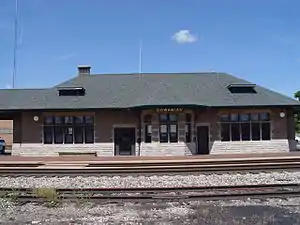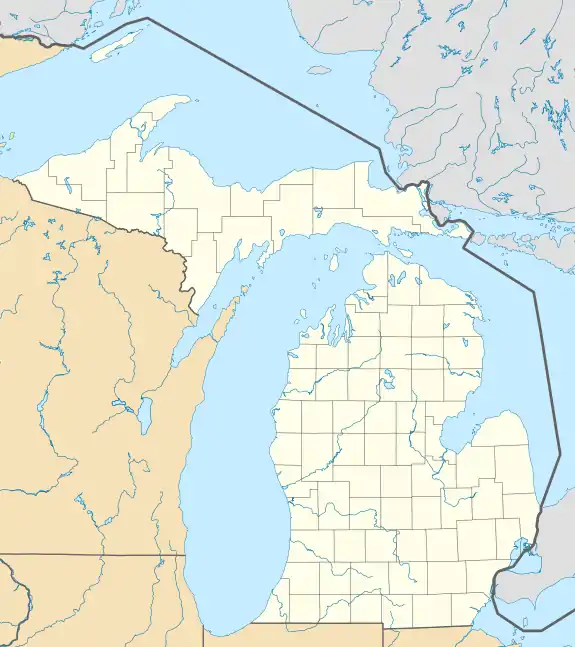Dowagiac station
Dowagiac is a train station in Dowagiac, Michigan, served by Amtrak, the United States' railroad passenger system. The station was built by the Michigan Central Railroad in 1902, and added to the National Register of Historic Places in 1993.
Dowagiac, MI | |||||||||||||||||||||||
|---|---|---|---|---|---|---|---|---|---|---|---|---|---|---|---|---|---|---|---|---|---|---|---|
 Trackside view of Dowagiac's historic former Michigan Central Railroad Depot | |||||||||||||||||||||||
| Location | 200 Depot Drive Dowagiac, MI 49047 | ||||||||||||||||||||||
| Line(s) | Michigan Line | ||||||||||||||||||||||
| Platforms | 1 side platform | ||||||||||||||||||||||
| Tracks | 2 | ||||||||||||||||||||||
| Construction | |||||||||||||||||||||||
| Parking | Yes; Free | ||||||||||||||||||||||
| Disabled access | Yes | ||||||||||||||||||||||
| Other information | |||||||||||||||||||||||
| Station code | DOA | ||||||||||||||||||||||
| History | |||||||||||||||||||||||
| Opened | 1903 | ||||||||||||||||||||||
| Rebuilt | 1995 | ||||||||||||||||||||||
| Passengers | |||||||||||||||||||||||
| 2018 | 4,975[1] | ||||||||||||||||||||||
| Services | |||||||||||||||||||||||
| |||||||||||||||||||||||
| |||||||||||||||||||||||
Michigan Central Railroad Dowagiac Depot | |||||||||||||||||||||||
 Location within the state of Michigan  Dowagiac station (the United States) | |||||||||||||||||||||||
| Location | Dowagiac, Michigan, USA | ||||||||||||||||||||||
| Coordinates | 41°58′51″N 86°6′32″W | ||||||||||||||||||||||
| Built | 1903 | ||||||||||||||||||||||
| Built by | M. J. Rogers | ||||||||||||||||||||||
| Architect | likely Spier and Rohns[2] | ||||||||||||||||||||||
| Architectural style | Tudor Revival | ||||||||||||||||||||||
| NRHP reference No. | 93001349[3] | ||||||||||||||||||||||
| Added to NRHP | 1993 | ||||||||||||||||||||||
It is served by Amtrak's Blue Water and Wolverine trains and was formerly a stop for the International Limited. The Limited commenced service from Chicago to Toronto in 1982, and was discontinued in 2004. It was a joint operation by Via Rail and Amtrak.[4]
History
The Michigan Central Railroad built a set of tracks providing passenger service through Dowagiac in 1848.[5] A new depot was constructed in the 1870s.[6] The current station, replacing the 1870s station, is the third constructed by the Michigan Railroad in Dowagiac.[2] The architect for the station is not documented, but is almost certainly the firm of Spier and Rohns. The railway hired contractor M. J. Rogers of Detroit to supervise construction. The building was completed in 1903, and has remained in use as a passenger station since that time. A restoration project took place in 1995.[5]
Description
The depot is a single-story brick Tudor Revival structure trimmed with limestone.[2] The depot consists of two hip roof buildings, one for passengers and one for baggage, connected with a gable roof canopy supported by metal columns. The passenger station has a square two-story tower projecting from the street side and a projecting octagonal ticket office on the track side. The station is accessed through a port cochere and glassed-in entry porch. Hip roof dormers are placed on the roof, and rows of square head windows line the sides of both the passenger station and baggage depot.
References
- "Amtrak Fact Sheet, FY2018, State of Michigan" (PDF). Amtrak. June 2019. Retrieved 26 December 2019.
- "Michigan Central Railroad Dowagiac Depot". Michigan State Housing Development Authority. Archived from the original on December 30, 2013. Retrieved December 29, 2013.
- "National Register Information System". National Register of Historic Places. National Park Service. July 9, 2010.
- Matt Melzer (23 April 2004). TrainWeb.org http://www.trainweb.com/travelogues/mattmelzer/2004d21a.html.
From 1982, Amtrak and VIA Rail Canada had jointly operated the International train between Chicago and Toronto
Missing or empty|title=(help) - Louis Van Winkle (December 2003). "Dowagiac". Archived from the original on February 5, 2012. Retrieved December 29, 2013.
- Steven Arseneau; Ann Thompson (2005), Dowagiac, Arcadia Publishing, p. 11, ISBN 9780738534220